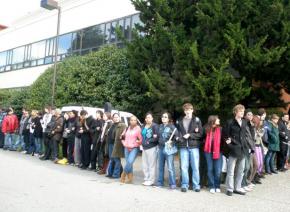Why is SFSU fining activists?
Eleven students who occupied the business administration building at San Francisco State University (SFSU) last December are being told to pay a fine for their actions--amounting to the cost to the school for bringing in riot police to break up the occupation.
The occupation was organized to protest budget cuts, furloughs for SFSU faculty and fee hikes for students. Some 14 students barricaded themselves inside the building, while large numbers of supporters--reaching 300 at one point--ringed the building outside. Around 24 hours after it began, police clad in riot gear burst into the building with guns drawn and removed the occupiers.
The following statement about the university's punitive fines was written by SFSU students , and .
ON DECEMBER 9, 2009, 11 San Francisco State University students used desks and chairs to barricade themselves inside the College of Business building. This was a peaceful protest, a response to the budget cuts and other attacks on public education underway in California.
The occupiers spent twenty-four hours in the reclaimed space. Throughout the course of the day, hundreds of students came together, more or less spontaneously, to defend the occupation. These students formed new relationships and began to feel their collective power. A new movement for justice, equality and unity was emerging.
The occupiers attempted to set up lines of dialogue with SFSU administration, but the administration refused to respond. Instead of negotiating with the peaceful protest, the administration assembled a "critical response" police team, drawing from all CSU campuses across the state.
Dressed in full-riot armor, the police arrived in the early hours of December 10. After dispersing the crowd of students outside the building--throwing a few to the ground in process--the police entered the occupied building through a broken classroom window, guns drawn. The occupiers peacefully complied with the demands of police and were removed from the building, with their hands restrained by painfully tight zip-ties.

The arrested students met with Dean of Student Judicial Affairs Donna Cunningham and Dean of Student Affairs Will Flowers. At this meeting, they signed an agreement which was proposed to them as a "means of peace and security from false charges and accusations."
Absurdly, SFSU administration is now demanding that the signatories of this contract collectively pay a fine of $8,186--in order to pay the bill for the riot police who pointed loaded guns at them.
The actions of the student occupiers did not adhere to the SFSU Student Code of Conduct, but if that Code of Conduct gets in the way of students' ability to take action in pursuit of social justice, it should be disobeyed.
The student occupiers were drawing upon a long tradition of civil disobedience. Our own campus was the site of a historic student strike in 1968. The strike was what won the very first, and what remains the only, College of Ethnic Studies in the world.
More recently, the UNITE HERE Local 2 hotel workers' union in San Francisco has used civil disobedience tactics like sit-ins as part of a struggle against unlawful intimidation on the part of hotel management. Should the struggling hotel employees be made to foot the bill for the police who arrest them?
The $8,186.71 charge to the occupiers will make it impossible for some of them to afford to continue taking classes at San Francisco State. This should be seen as a deliberate scare tactic, used to discourage students and faculty resistance to the budget cuts.
It does not have to go down like this. SFSU President Robert Corrigan said himself, "We took a vow of poverty when we came into this profession, but not of silence and obedience." President Corrigan should stand by his word and stop his campaign against peaceful civil disobedience. Better yet, he should stop complying with Sacramento's brutal budget cuts and join us in resistance.


